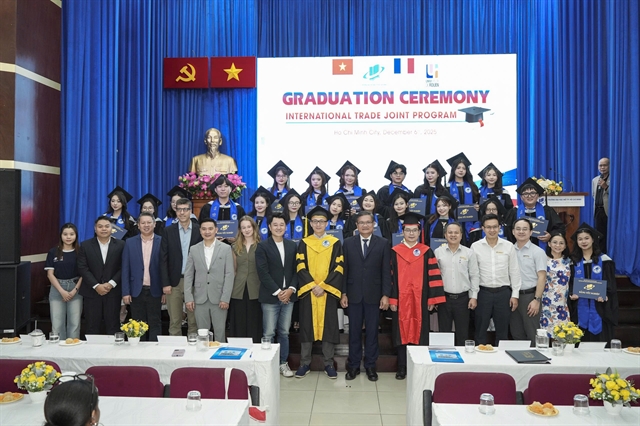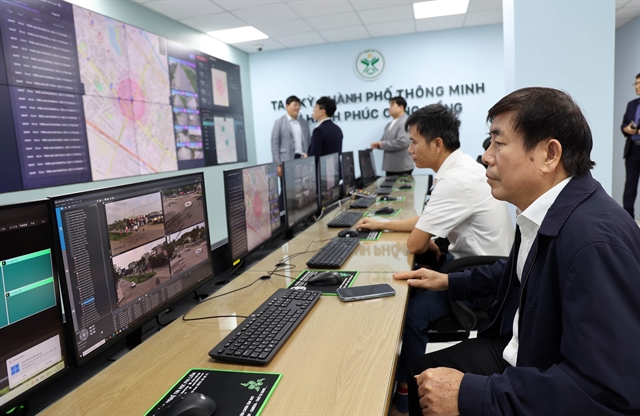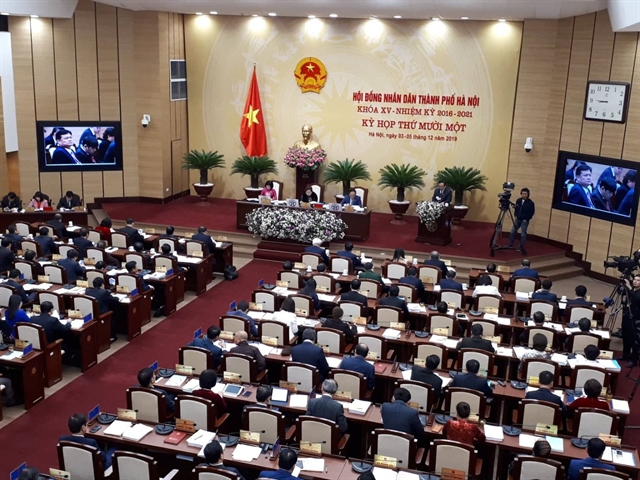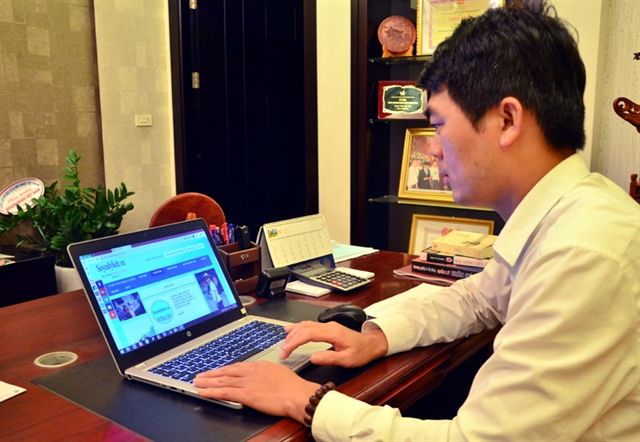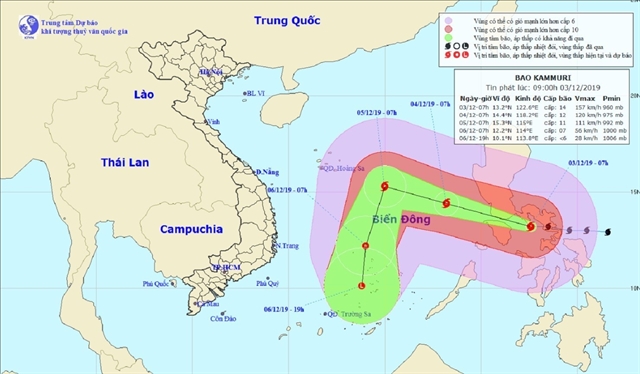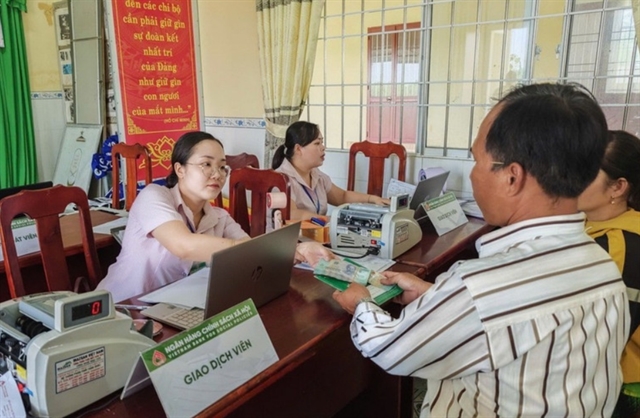
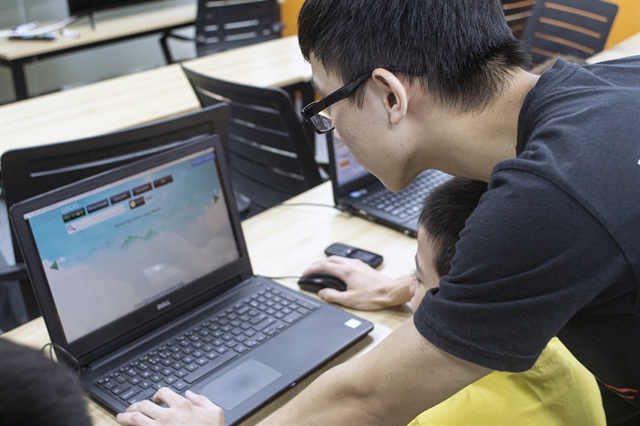
|
Khánh Dương
HÀ NỘI Today is a special day for 12-year-old Nguyễn Khắc Nhật Nam at his game design class.
Nam started to learn 3D game programming three months ago, and he will be presenting his creation to his classmates, teachers and parents.
Showing everyone how to play the game which features an adventure into the universe to kill monsters, Nam said it took him about five days to outline the idea and programme the game.
A final product is a requirement for all students at MindX, a technology and start-up school for children and working adults based in Hà Nội and HCM City.
“I want to become a computer programmer. I hope my programming skills will help me realise my dream of opening a start-up in the tech sector,” Nam said.
Nguyễn Thị Thu Hà, one of the three co-founders of MindX, said programming will become a shared language worldwide, like English, in five to ten years.
“It is relatively new in Việt Nam but in Silicon Valley in the US, everyone, no matter if their background is in technology, sales or marketing, and even investors, knows how to programme.
“The earlier children start to learn computer programming, the better. Primary school is the golden time to start programming training so that children have enough time to fully develop their skills,” she said.
At MindX, which means extraordinary mind, children at primary school or early secondary school like Nam are taught simple programming skills to improve their logical thinking and inspire their passion for computers.
Applying technology in teaching is not a new concept in Việt Nam, but MindX has something that makes it stand out.
It is a business providing a highly-interconnected eco-system which combines computer programming training and a co-working space.
Every evening there are robotics, programming, 3D drawing, and virtual reality/augmented reality classes for students and working adults. During the daytime when there are no classes, the area is used as a co-working space which hosts famous local and foreign start-ups and start-up investment funds like Jamja, Wefit, VNI, Ninja Van and Nextrans Capital.
MindX’s co-working space has become a networking platform where students can come to learn and discuss with start-ups and investors in the technology sector.
Many of the students have taken these opportunities to get involved in start-up projects or become employees of firms based there. Aspiring start-ups also use this golden opportunity to ask for advice, learn from experienced professionals and seek investments from start-up funds.
“Young students at primary and secondary school levels learn at the co-working space and gain a sense of what the start-up environment is like,” Hà said.
Sow the seeds
At later levels of secondary and high schools, MindX provides students with technical skills so they are able to design websites and apps to address social issues such as the environment and education.
After training at MindX, a lot of high school students are capable of working as professional computer programmers at the age of 14 or 15.
It takes a university freshman who knows nothing about programming eight months to one year to be equipped with the necessary skills to be able to work for a programming company with a starting salary of VNĐ8-10 million (US$350-435).
That is also a target at MindX: to give university students practical skills so they can find jobs, not theoretical work at school.
By combining technology training with a co-working space, MindX is able to save on expenses and maximise the value for students and the start-up community.
Born in a poor rural area in the north of Việt Nam, unlike most of her friends, MindX’s CEO Thu Hà was lucky to continue her studies at a school in the town and then was accepted to the Foreign Trade University, one of leading educational institutes in Việt Nam.
“Education can change a person’s life and create power among the future of children,” Hà said.
As one of Google's student ambassadors in Việt Nam in 2015, Hà traveled around Southeast Asia and other Asian countries to learn about the significance of technology.
“Việt Nam can become an emerging tech hub in the region, even the world.”
After almost four years, MindX now has five schools and co-working spaces based in Hà Nội and HCM City. About 8,500 students and working adults have been trained so far.
MindX has recently successfully raised funding of US$500,000 from ESP Capital, Việt Nam's leading early stage venture fund, with the backing of individual investors.
MindX aims to train tech workers who innovate ‘made-in-Việt Nam’ products and develop high-quality manpower, and plans to universalise the model by expanding to 20-50 schools and co-working spaces.
MindX is developing an online syllabus so that technology training can reach children in disadvantaged and remote areas.
“We are not that ambitious to think that all our students will be a success. We just hope we will be able to sow the ‘seeds’ for those who will become experts in the field and have impacts on society.
“Malaysia has Grab. Indonesia has Go-Jek. We will have a name that will spring into the minds of foreigners when they think about Việt Nam’s tech companies.” VNS
.jpg)
|
| MindX's co-working space. |

